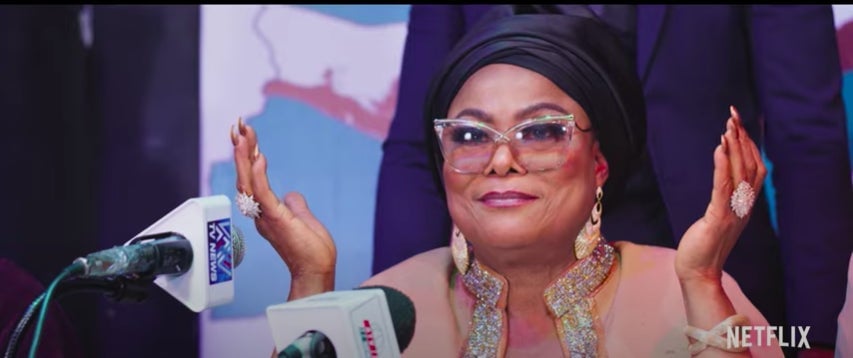Netflix’s first original Nigerian series builds on a hugely popular political drama set in Lagos
The official trailer for Nigeria’s first original Netflix series opens with a dramatic question, put by a reporter to fearless political operative Eniola Salami, the show’s lead character: “Madam, why do they call you the King of Boys?” he asks.


The official trailer for Nigeria’s first original Netflix series opens with a dramatic question, put by a reporter to fearless political operative Eniola Salami, the show’s lead character: “Madam, why do they call you the King of Boys?” he asks.
The answer was first set up in King of Boys, a hugely successful 2018 movie produced by Nigerian filmmaker Kemi Adetiba. In it, Salami is a businesswoman who belongs to a clique of plunderers. The movie portrayed the dark behind-the-scenes machinations of politics in Nigeria, and resonated with viewers in the months leading up to the 2019 general elections. It became even more popular after becoming available on Netflix in September that year.
King of Boys ended on a knife-edge (spoiler alert). Salami, a.k.a. Laburu is blackmailed by rivals, escapes death in a Nigerian prison, and flees abroad, leaving an opening for a sequel. But instead of another three hour-long film, Adetiba and Netflix decided to make the next King of Boys into a seven-part series. The trailer is packed with intrigue, as Laburu returns home from a five-year exile, in all her menacing glory, to run for governor of Lagos state.
Netflix’s library of African originals is growing
King of Boys: The Return of the King will premier on Aug. 27. It joins a list of Netflix original series in Africa, led by Queen Sono, a South African spy drama which premiered in February 2020. A few months later, the streaming platform released Blood and Water, a depiction of Black wealth and inequality also set in South Africa.
Queen Sono was renewed for a second season but canceled by Netflix last December. According to the show’s creator Kagiso Lediga, the season was to be shot in different countries on the continent, but the pandemic made such an elaborate project untenable. Netflix did not give an official reason but promised to make “more compelling ‘Made-in-South Africa’ stories,” a spokesperson told Deadline.
King of Boys will premiere off the back of its success as a movie, giving it a head start to other shows. The financial details of the deal are not known, but the effects of a Netflix budget already seem notable, judging from the trailer. More importantly, the investment has strengthened Adetiba’s resolve to continue a storytelling theme she been passionate about: the lives of Nigerian women in power, first evident in King Women, her 2017 documentary series.
As interest in the continent’s stories expand across the world, investment into African entertainment startups climbed to an all-time high of $13.9 million in 2020. For streaming video on demand in particular, the number of African subscriptions is projected to reach 12.96 million in 2026. The increase will be complimented by a massive jump in revenues for over-the-top movies and TV episodes, from $392 million in 2020 to $1.7 billion by 2026, according to Digital TV Research (paywall).
Veteran Nigerian actress Sola Sobowale will reprise her role as Salami in King of Boys. Sobowale was also a lead start in The Wedding Party, 2016 romantic comedy produced by Adetiba that was a smash cross-over hit for Nollywood.
Their new project retains some lead acts from the first King of Boys movie, while offering roles to a mix of familiar and rising actors. Charles Oputa, a pop star from the 70’s and 80s popularly known as Charly Boy, finds a place in the new series, as does Richard Mofe-Damijo, another veteran of Nigerian cinema.
Sign up to the Quartz Africa Weekly Brief here for news and analysis on African business, tech, and innovation in your inbox.